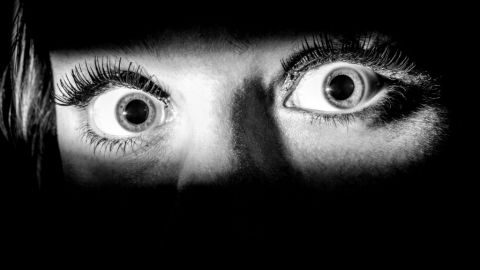Hyperventilation Syndrome
What is hyperventilation syndrome?
Hyperventilation syndrome is a condition brought on by rapid, deep breathing. It can cause fainting. Hyperventilation can be very alarming because it may seem to be a more serious problem such as an asthma attack or stroke.
How does it occur?
The rapid, deep breathing of hyperventilation most often occurs when you are anxious or upset. You are rarely even aware that you are breathing rapidly.
When you breathe too fast and deeply, you breathe out a lot more carbon dioxide than normal. Less carbon dioxide in your body affects your nervous system and brain. This causes the symptoms of hyperventilation.
What are the symptoms?
The symptoms of hyperventilation usually progress as follows:
- shortness of breath
- lightheadedness
- numbness and tingling of the skin (in the hands or around the mouth)
- spasms or cramps in the hands and feet occasionally
How is it diagnosed?
The diagnosis of hyperventilation depends on several factors, including how well your healthcare provider knows you, your age, and especially your overall medical condition.
Your medical history is important. Your healthcare provider will probably ask:
- How long have you had the symptoms? How often have they occurred in the past?
- Did you have any other symptoms just before you hyperventilated, such as a cough (especially coughing up blood)?
- Do you have any other medical problems?
- Are you taking any medicines?
- What else was happening when you hyperventilated? Were these events upsetting?
If you are having symptoms when you see your healthcare provider, you may have tests to check the level of oxygen in your blood. Usually this is done by placing a pulse oximeter on your ear or finger. Sometimes a sample of blood is tested for levels of oxygen and carbon dioxide.
Your provider may ask for a chest X-ray to make sure that you do not have any other chest or lung problems.
How is it treated?
The treatment for hyperventilation is simple. All you need to do is re-breathe carbon dioxide to get your body's oxygen/carbon dioxide balance back to normal. You can do this by closing your mouth and breathing slowly through your nose. Or for faster results, hold a paper bag tightly around your mouth and breathe in and out several times into the bag until you feel better.
How can hyperventilation be prevented?
If you tend to hyperventilate, make sure you know the symptoms. If you can recognize the symptoms early, you can relax and slow down your breathing before you hyperventilate.
If you are hyperventilating more often or it is getting worse, seeing a counselor might help. A counselor can help you identify and treat the emotional problem that might be causing you to hyperventilate.







Thanks for the post, i totally understand what you are saying….but ones cause is up to ones self. When we start getting these symptoms..the tingling, the heart race, the dizzyness, the fainting..a huge cause is because we are hyperventalating and don't know it. I should apoligize because i tried the post before with something but it did not take so I didn't follow up with what i wrote before.
I included this blog BECAUSE i see umpteen blogs posted when people are feeling physical symptoms and don't know what to do. I always let them know this could be a cause and to check that first. They usually respond just like you did by telling me to discount this whole thing i posted..or at least half of it, there has to be another reason.
fact is no one yet knows what causes it, but they do know a large part of the physical symptoms that you feel are due to hyperventalation. I only wanted to post this for people to remember when they are in trouble..breathing in a paper bag may stop them from feeling faint, tingling, numbnes, etc tec..
I know this is difficult to belive one can do it while going thru panic, but it may help. Everyones different, and it;'s up to oneself to find ones triggers, but we ALL go thru this and I see the symptoms repeated over and over again. I am in no way stating this will take care of it, but am saying it may help and it is a step we may forget and instead try and reach for some pill to calm you down.
As far as what one should do…thats up to you, there are thousands of blogs and tips all over the site, but I never see anything on this topic here at all. Perhaps it's because people don't really accept this as a reality for themselves and instead think there is always something they havent found yet that is the cause. Maybe someday they will, but until that time, harsh reality is that you have to come at it logically, become less afraid of it, and one day you can retrain your mind to ignore the symptoms.
I cannot offer explanations on the causes, because mine differ from yours I am sure, most of the times I don't even know I am doing anything out of ordinary before my nervous system goes out of whack. I don't like elevators, I don't like to sit in loud movies much anymore without my anxiety going up. I do notice during this time, the tingling, the numbnes the shaking… and i have to ask someone. "does my breathing sound normal" and thats when they tell me I seem to be breathing quickly…guess what, I have no idea I am doing it at the time. (????)
So, take this info what you will, I offer nothing else more than I have in the past, but I am offering a quick fix to a problem we all have that may help. It's up to you to find your triggers and then how your going to tackle those triggers and how you react, otherwise you will always continue to get worse no matter what meds you decide to take.
sorry to sound so harsh, but your post sounded like you are skeptical to the info I have posted, I in no way every meant the info to mean a cure for the condition. I just provided it as a way to help those to try out to see if it works to get rid of the physical things. It takes some doing, but it actually does work in a lot of instances. I am in no way trying to BELITTLE anyones anxiety here.
This trick may not get rid of the fear , but may get rid of the physical feelings that you have that feels that you are having a heart attack and you cant breathe well.